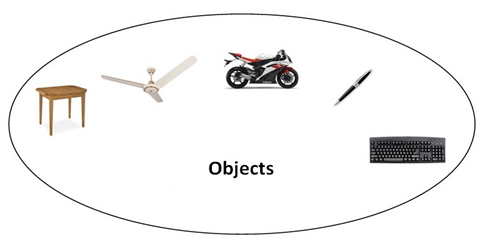TheDeveloperBlog.com
C-Sharp | Java | Python | Swift | GO | WPF | Ruby | Scala | F# | JavaScript | SQL | PHP | Angular | HTML
C++ OOPs Concepts
C++ OOPs Concepts for beginners and professionals with examples on constructor, if-else, switch, break, continue, comments, arrays, object and class, exception, static, structs, inheritance, aggregation etc.
C++ OOPs ConceptsThe major purpose of C++ programming is to introduce the concept of object orientation to the C programming language. Object Oriented Programming is a paradigm that provides many concepts such as inheritance, data binding, polymorphism etc. The programming paradigm where everything is represented as an object is known as truly object-oriented programming language. Smalltalk is considered as the first truly object-oriented programming language. OOPs (Object Oriented Programming System)
Object means a real word entity such as pen, chair, table etc. Object-Oriented Programming is a methodology or paradigm to design a program using classes and objects. It simplifies the software development and maintenance by providing some concepts: 
ObjectAny entity that has state and behavior is known as an object. For example: chair, pen, table, keyboard, bike etc. It can be physical and logical. ClassCollection of objects is called class. It is a logical entity. InheritanceWhen one object acquires all the properties and behaviours of parent object i.e. known as inheritance. It provides code reusability. It is used to achieve runtime polymorphism. PolymorphismWhen one task is performed by different ways i.e. known as polymorphism. For example: to convince the customer differently, to draw something e.g. shape or rectangle etc. In C++, we use Function overloading and Function overriding to achieve polymorphism. AbstractionHiding internal details and showing functionality is known as abstraction. For example: phone call, we don't know the internal processing. In C++, we use abstract class and interface to achieve abstraction. EncapsulationBinding (or wrapping) code and data together into a single unit is known as encapsulation. For example: capsule, it is wrapped with different medicines. Advantage of OOPs over Procedure-oriented programming language
Next TopicC++ Object and Class
|
Related Links:
- C++ set key_comp() Function
- C++ set value_comp() Function
- C++ set find() Function
- C++ set count() Function
- C++ set lower_bound() Function
- C++ set upper_bound() Function
- C++ set equal_range() Function
- C++ set get_allocator() Function
- C++ set operator==
- C++ set operator!=
- C++ algorithm iter_swap() function
- C++ multiset equal_range() function
- C++ Program to Convert Number in Character
- C++ Program to Print Alphabet Triangle
- C++ Vector back() function
- C++ Program to Print Number Triangle
- C++ algorithm search() function
- C++ Program to Generate Fibonacci Triangle
- Top 39 C++ Interview Questions (2021)
- C++ multiset lower_bound() function
- C++ multiset upper_bound() function
- C++ multiset get_allocator() function
- C++ multiset operator==
- C++ algorithm adjacent_find() function
- C++ algorithm any_of() function
- C++ multiset non member operator greater than=
- C++ multiset swap() function
- C++ multiset operator!=
- C++ algorithm copy() function
- C++ algorithm remove_if() function
- C++ algorithm reverse_copy() function
- C++ algorithm copy_if() function
- C++ Math llrint() Function
- C++ Math tgamma() Function
- C++ Math lgamma() Function
- C++ Math nearbyint() Function
- C++ Math remainder() Function
- C++ Math remquo() Function
- C++ Math fabs() Functions
- C++ Math abs() Functions
- C++ Math fma() Function
- C++ Math fpclassify() Function
- C++ Math isgreaterequal() Function
- C++ algorithm count() function
- C++ algorithm count_if() function
- C++ algorithm equal() function
- C++ algorithm find_if() function
- C++ algorithm all_of() function
- C++ algorithm copy_backward() function
- C++ algorithm copy_n() function
- C++ algorithm is_permutation() function
- C++ algorithm mismatch() function
- C++ algorithm none_of() function
- C++ algorithm swap() function
- C++ algorithm fill() function
- C++ algorithm replace_copy_if() function
- C++ algorithm replace_copy() function
- C++ algorithm replace_if() function
- C++ algorithm transform() function
- C++ algorithm fill_n() function
- C++ set crend() Function
- C++ set empty() Function
- C++ set size() Function
- C++ set max_size() Function
- C++ Output Iterator
- C++ Programs
- C++ algorithm move_backward() function
- C++ algorithm reverse() function
- C++ algorithm find_if_not() function
- C++ Math isfinite() Function
- C++ Math isinf() Function
- C++ multiset operator less than
- C++ multiset non member operator less than=
- C++ multiset non member operator greater than
- C++ Math isnan() Functions
- C++ Math isnormal() Function
- C++ Math signbit() Function
- C++ Math isgreater() Function
- C++ Math less() Function
- C++ Math isunordered() Function
- C++ Math erf() Function
- C++ Math erfc() Function
- C++ set cbegin() Function
- C++ set end() Function
- C++ String rbegin() function
- C++ algorithm random_shuffle() function
- C++ algorithm remove_copy_if() function
- C++ Vector front() function
- C++ set
- C++ Stack
- C++ Queue
- C++ Stack empty() Function
- C++ Stack pop() Function
- C++ Queue emplace() Function
- C++ Queue empty() Function
- C++ Queue front() Function
- C++ algorithm is_sorted_until() function
- C++ algorithm is_sorted() function
- C++ algorithm rotate_copy() function
- C++ algorithm rotate() function
- C++ Stack push() Function
- C++ Stack size() Function
- C++ set swap() Function
- C++ set clear() Function
- C++ set emplace() Function
- C++ set emplace_hint() Function
- C++ algorithm merge() function
- C++ algorithm set_union() function
- C++ Queue pop() Function
- C++ Math cos() Function
- C++ Queue push() Function
- C++ set insert() Function
- C++ set erase() Function
- C++ algorithm find() function
- C++ Math sin() Function
- C++ Queue size() Function
- C++ multiset
- C++ Math tan() Function
- C++ Math log10() Function
- C++ String compare() function
- C++ Math acos() Function
- C++ String length() function
- C++ Math asin() Function
- C++ String swap() function
- C++ multiset constructor
- C++ Math atan() Functions
- C++ String size() function
- C++ set operator less than
- C++ set operator less than=
- C++ set operator greater than
- C++ Math atan2() Function
- C++ String resize() function
- C++ String replace() function
- C++ multiset clear() function
- C++ multiset emplace() function
- C++ multiset erase() function
- C++ multiset destructor
- C++ multiset begin() function
- C++ multiset end() function
- C++ multiset operator= function
- C++ multiset rbegin() function
- C++ multiset crbegin() function
- C++ algorithm partial_sort() function
- C++ algorithm sort() function
- C++ multiset swap() function
- C++ multiset rend() function
- C++ multiset cbegin() function
- C++ multiset cend() function
- C++ multiset emplace_hint() function
- C++ multiset find() function
- C++ History
- C++ Features
- C++ set operator greater than=
- C++ set swap() Function (Non-member)
- C++ String max_size() function
- Turbo C++ - Download and Installation
- C++ Program
- C++ Basic Input Output (cin, cout, endl)
- C++ Variable
- C++ Object Class
- C++ Vector rbegin() function
- C++ Data types
- C++ Keywords
- C++ Vector clear() function
- C++ Vector max_size() function
- C++ Operators
- C++ if-else
- C++ switch
- C++ For Loop
- C++ While Loop
- C++ Math cosh() Function
- C++ Do-While Loop
- C++ Math sinh() Function
- C++ Break Statement
- C++ Math tanh() Function
- C++ Continue Statement
- C++ Math acosh() Function
- C++ Goto Statement
- C++ Math asinh() Function
- C++ Math atanh() Function
- C++ Comments
- C++ Math exp() Function
- C++ Math frexp() Function
- C++ Math log() Function
- C++ Functions
- C++ Math modf() Function
- C++ Recursion
- C++ Storage Classes
- C++ Forward Iterator
- C++ Input Iterator
- C++ Math exp2() Function
- C++ multiset key_comp() function
- C++ algorithm unique_copy() function
- C++ Math llround() Function
- C++ Arrays
- C++ Passing Array to Function
- C++ Multidimensional Arrays
- C++ Pointers
- C++ OOPs Concepts
- C++ Constructor
- C++ Copy Constructor
- C++ Destructor
- C++ algorithm upper_bound() function
- C++ this Pointer
- C++ static
- C++ Structs
- C++ Enumeration
- C++ friend function
- C++ Math Functions
- C++ Inheritance
- C++ Aggregation
- C++ Polymorphism
- C++ Overloading
- C++ algorithm lower_bound() function
- C++ Vector
- C++ Math expm1() Function
- C++ Math log1p() Function
- C++ Math log2() Function
- C++ String append() function
- C++ Tutorial | Learn C++ Programming
- C++ multiset crend() function
- C++ multiset empty() function
- C++ multiset insert() function
- C++ Math logb() Function
- C++ String at() function
- C++ Math scalbn() Function
- C++ String find() function
- C++ Math scalbln() Function
- C++ String find_first_of() function
- C++ algorithm replace() function
- C++ algorithm swap_ranges() function
- C++ Math ilogb() Function
- C++ String find_first_not_of() function
- C++ Math copysign() Function
- C++ String find_last_of() function
- C++ Math nextafter() Function
- C++ String find_last_not_of() function
- C++ Math nexttoward() Function
- C++ String insert() function
- C++ String push_back() function
- C++ String assign() function
- C++ algorithm search_n() function
- C++ algorithm generate_n() function
- C++ String copy() function
- C++ algorithm find_end() function
- C++ algorithm find_first_of() function
- C++ algorithm generate() function
- C++ algorithm remove() function
- C++ algorithm is_partitioned() function
- C++ String begin() function
- C++ String cbegin() function
- C++ String cend() function
- C++ String clear() function
- C++ String crbegin() function
- C++ Function Overriding
- C++ virtual function
- C++ vs C#
- C++ Convert int to string
- C++ Components of STL
- C++ String Data() function
- C++ String empty() function
- C++ Algorithm
- C++ Iterators
- C++ Bidirectional Iterator
- C++ Namespaces
- C++ Strings
- C++ String erase() function
- C++ Stack emplace() Function
- C++ Exception Handling
- C++ String front() function
- C++ vs Java
- C++ try-catch
- C++ String operator+=() function
- C++ multiset value_comp() function
- C++ multiset count() function
- C++ User-Defined Exceptions
- C++ Templates
- C++ Signal Handling
- C++ File and Stream
- C++ String operator=() function
- C++ String operator[]() function
- C++ String rfind() function
- C++ String end() function
- C++ String capacity() function
- C++ String shrink_to_fit() function
- C++ String crend() function
- C++ algorithm shuffle() function
- C++ algorithm stable_partition() function
- C++ String reserve() function
- C++ String pop_back() function
- C++ Vector at() function
- C++ String c_str() function
- C++ Vector swap() function
- C++ Vector push_back() function
- C++ Vector pop_back() function
- C++ Vector empty() function
- C++ set destructor
- C++ set operator=() Function
- C++ set begin() Function
- C++ Vector insert() function
- C++ Stack top() Function
- C++ Queue back() Function
- C++ Vector erase() function
- C++ String back() function
- C++ String rend() function
- C++ Vector resize() function
- C++ Vector size() function
- C++ Vector capacity() function
- C++ Math islessgreater() Function
- C++ Vector assign() function
- C++ Vector operator=() function
- C++ Vector operator[]() function
- C++ Vector end() function
- C++ Vector emplace() function
- C++ Vector emplace_back() function
- C++ Vector rend() function
- C++ Vector begin() function
- C++ Vector cend() function
- C++ Vector cbegin() function
- C++ Math fdim() Function
- C++ Vector crbegin() function
- C++ Math fmax() Function
- C++ Vector crend() function
- C++ Math fmin() Function
- C++ Vector data() function
- C++ Vector shrink_to_fit() function
- C++ Math pow() Function
- C++ algorithm unique() function
- C++ Math sqrt() Function
- C++ Math cbrt() Function
- C++ Math islessequal() Function
- C++ Math hypot() Function
- C++ Math ceil() Functions
- C++ algorithm for_each() function
- C++ multiset max_size() function
- C++ multiset size() function
- C++ Math floor() Function
- C++ set constructor
- C++ Math round() Function
- C++ algorithm equal_range() function
- C++ algorithm includes() function
- C++ algorithm inplace_merge() function
- C++ Math lround() Functions
- C++ algorithm partition_copy() function
- C++ algorithm partition_point() function
- C++ algorithm partition() function
- C++ Math fmod() Function
- C++ Program to Reverse Number
- C++ Math trunc() Function
- C++ Program to Swap Tow Number Without Third Variable
- C++ algorithm stable_sort() function
- C++ algorithm binary_search() function
- C++ Math rint() Function
- C++ Program to Convert Decimal to Binary
- C++ Math lrint() Function
- C++ algorithm nth_element() function
- C++ algorithm partial_sort_copy() function
- C++ set cend() Function
- C++ set rbegin() Function
- C++ set rend() Function
- C++ set crbegin() Function
- C++ algorithm move() function
- C++ algorithm remove_copy() function

